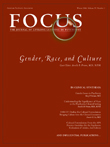In 1994 APA published DSM-IV, which included an Outline for Cultural Formulation to provide a concise method of incorporating cultural issues into the diagnostic process. The Outline had been proposed by the National Institute of Mental Health Workgroup on Culture, Diagnosis, and Care, which was initiated by Delores L. Parron, Ph.D., Director of the Office of Special Populations, and chaired by Juan E. Mezzich, M.D., Ph.D., a member of the APA Task Force on DSM-IV. The Outline was published as part of Appendix I along with a Glossary of Culture-Bound Syndromes. The Outline remained relatively obscure for several years—no doubt largely because of its location deep in the appendix section of DSM-IV—but that has begun to change. A search of the PubMed and PsycINFO databases for “DSM-IV Outline for Cultural Formulation” from 1994 to 2005 yielded 10 unduplicated citations (
1–
10) for articles that describe the Outline or illustrate its use with one to four cases.
In the 2001 revision of the Accreditation Council for Graduate Medical Education program requirements for psychiatry (
11), residency training programs were required to include experiences in “integrative case formulation that includes neurobiological, phenomenological, psychological, and sociocultural issues involved in diagnosis and management of cases presented” (p. 27). This description of the clinical formulation has been incorporated into the Outline in the Practice Guideline for the Psychiatric Evaluation of Adults, 2nd edition (
12) (see next article). The Outline “provides a systematic method of considering and incorporating sociocultural issues into the clinical formulation.” In other words, the use of the Outline ensures that we put cultural issues on the radar screen, thereby enriching our biopsychosocial understanding of our patients, broadening our differential diagnoses, and improving our treatment planning.
This inclusion is very timely, coming after the release of the Surgeon General’s report
Mental Health: Culture, Race, and Ethnicity (
13), which documented mental health disparities for racial and ethnic minority groups and challenged the mental health professions to reduce those disparities through culturally competent clinical care, training, and research. APA’s strategic plan to reduce disparities focused on these areas as well (
14). The Liaison Committee on Medical Education and the Accreditation Council for Graduate Medical Education have added accreditation standards involving cultural competence, and teaching the use of the Outline can help institutions meet these standards.
This issue of
FOCUS joins a small but growing body of work that helps clinicians, educators, and trainees bring culture into the clinical encounter. Several teaching tools are available that explicate both the content and process of using the Outline. First, the Cultural Psychiatry Committee of the Group for the Advancement of Psychiatry published a monograph on the Outline and illustrated its use in six clinical cases (
15). Second, Harriet Koskoff, a filmmaker, created a 58-minute training videotape/DVD (
16) with 23 multicultural, multidisciplinary mental health professionals commenting on the five sections of the Outline. Third, approximately 17 clinical cases demonstrating the use of the Outline have been published in the quarterly journal
Culture, Medicine, and Psychiatry since 1995, including a number of excellent teaching cases (
17–
20). Finally, the
Clinical Manual of Cultural Psychiatry (
21) represents the collected wisdom from 10 years of teaching an APA annual meeting course on the use of the Outline with patients from minority racial/ethnic groups; it includes an appendix with a detailed inventory of specific approaches and questions clinicians can use to obtain information for each of the five components of the Outline.

